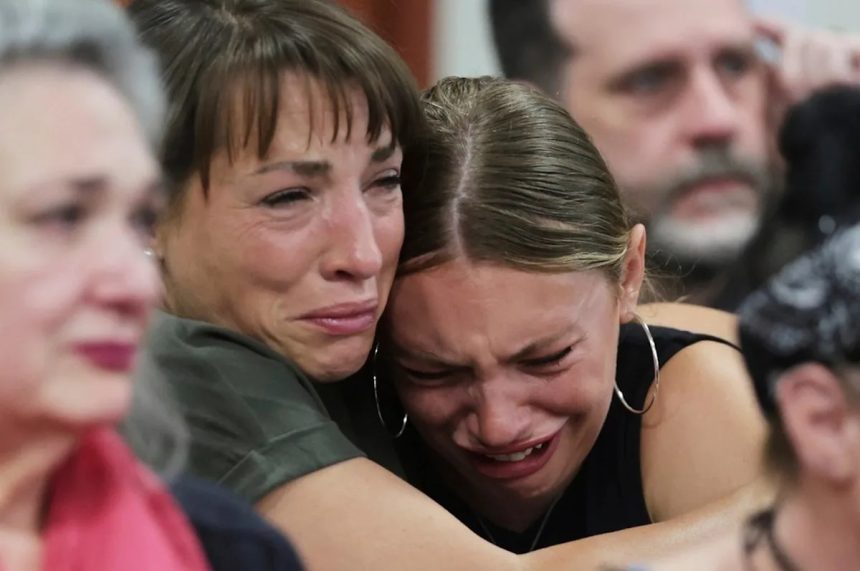In the weeks after the shocking murders of four University of Idaho students in November 2022, a Texas TikTok “psychic” accused a respected history professor of orchestrating the killings to cover up an affair with one of the victims. Her claims — which she said were based on her “spiritual research” through Tarot readings — were preposterous and provably false, but Ashley Guillard amassed 100,000 followers and garnered up to 2.5 million likes on her posts anyway. And she was not alone: countless other online sleuths who shared unfounded speculation, doxxed innocent people and even disparaged the victims’ families saw their social media posts go viral.
Kyle Green / AP
Dylan Mortensen gets a hug after speaking at Bryan Kohberger’s sentencing hearing on July 23, 2025.
The professor, Rebecca Scofield, sued Guillard for defamation, alleging that her TikToks tarnished her reputation, linked her name to “murder” in internet searches and subjected her to “ridicule and threats from Guillard’s online commenters” — causing her to fear for her and her family’s safety. In an interview with The Argonaut, Guillard claims she was only seeking to help the investigation and that she did not intentionally publish false information about Scofield.
A federal judge ruled in Scofield’s favor last summer, calling her TikToks “primarily self-serving, motivated by online viral attention, and made with an extremely harmful state of mind given the nature of the statements about [Scofield].” A jury trial to determine punitive damages is set for February 2026.
This is an exceptionally rare case, however. True crime content creators and those who post on social media are not held to the same standards as journalists, who are ethically bound by the principles of truthful, accurate and unbiased reporting.
Veteran “48 Hours” correspondent Erin Moriarty said she is troubled by the rising popularity of some “social media sleuths” who have “no journalism experience or apparent ethics.”
“There is nothing to keep a so-called sleuth from making false assertions and ruining lives,” she told me in a recent email interview.
After the Idaho student murders, the victims’ two surviving roommates were vilified by armchair detectives who accused them of killing their friends — even though police said in multiple press releases that the women had been cleared of suspicion. The online vitriol only intensified after court documents released following Bryan Kohberger’s arrest revealed that survivor Dylan Mortensen had come face-to-face with the killer and didn’t immediately notify authorities.

Indiana State Police
Abby Williams, 13, and Libby German, 14, were found dead near an abandoned railroad bridge where they were last seen hiking.
Family members of 13-year-old Abby Williams and 14-year-old Libby German say their lives were almost destroyed when the girls were kidnapped and killed in Delphi, Indiana, in 2017.
“When you rip a whole piece out of your life, you’ll never be the same,” Abby’s mother, Anna Williams, said at a CrimeCon 2025 panel last month in Denver, where she was joined onstage by Libby’s relatives.
The family members shared memories of the girls, opened up about their grief and discussed their reaction to Richard Allen’s conviction and 130-year prison sentence last year for their murders.
Libby and Abby’s families also talked about the shocking online harassment they have endured for years by amateur sleuths obsessed with “solving” the case themselves — even at the expense of retraumatizing the victims’ families and interfering with law enforcement investigations.
The girls’ murders went unsolved for more than five years — even though investigators publicly shared grainy video captured by Libby of their suspected killer. The whole time, the girls’ family members worked tirelessly to draw attention to the case in the hopes of eventually finding justice.
Libby’s grandfather, Mike Patty, knew he would be subjected to strangers “hiding behind a keyboard saying nasty things,” but felt the family “had no choice.”
“We knew there was risk involved in putting my family out there,” he told the CrimeCon audience. “I don’t really care about the criticism [and] the ridicule … [but] it was pretty harsh coming at me in the beginning.”
His wife, Becky Patty, said she is most upset by what she calls vicious online harassment of Libby’s older sister, Kelsi, who dropped the girls off at the trail where they were abducted less than half an hour later, according to the prosecutors’ timeline.
“There are some of them out there who are horrible to her, the accusations and stuff,” Becky Patty said. “It hurts me what they are saying about her. Say what you want about me, but leave my family alone.”
“I will never understand how people can be so awful to people they’ve never met, simply because we put ourselves out there in search of answers,” Kelsi tweeted in February 2022, above a screenshot of a direct message she received.
“Stop trying to spin your sisters murder into a f***ing career and go to the Police station right now and come clean,” the person wrote in part.
Becky Patty noted that the repercussions go beyond cruel comments about her granddaughter, and, similar to what Scofield alleged in her defamation suit, internet comments can potentially also damage Kelsi’s reputation and livelihood.
“[Prospective employers] look up your name, and if they see some of these things that people are saying, she’s gotta live with what these people who have no consequences are able to do, and that’s a problem,” Becky Patty said
Related: Hillary Clinton Just Hit On One Of Donald Trump’s Biggest Insecurities With Three Words

Michael Conroy / AP
Mike and Becky Patty speak with the media after authorities announced the arrest of Richard Allen for the 2017 murders of their granddaughter and her friend Abigail Williams, Oct. 31, 2022.
Prosecutor Nick McLeland, who had previously been barred by a gag order from discussing the Delphi case, noted that social media attacks on his office increased exponentially after Allen’s defense team shared graphic details about the crime scene and made unsubstantiated allegations that a pagan cult had been responsible for the girls’ murders.
“You’re always gonna have a group that’s against you in whatever argument you make,” he told me in an interview, but after the defense filing, “social media became a huge factor in our lives.”
“We didn’t want it, we didn’t ask for it, but it just happened,” McLeland added.
Jerry Holeman, the lead investigator on the Delphi case, noted that online critics were not privy to all the “facts and evidence” — and never will be.
“The public’s not going to ever know everything,” he told me. “We wish we could be that transparent, but we just can’t. There’s certain things that just can’t be out there in public, but it doesn’t mean we’re corrupt and hiding anything. We’re protecting the integrity of the victims at this point” — referring to the judge’s decision to permanently seal the crime scene and autopsy photos — “and before that, we were protecting the integrity of the investigation.”
Before the trial, McLeland said he vehemently argued against allowing cameras in the courtroom because he was worried that it might turn into a “circus,” and the judge agreed. She refused all media requests for it to be livestreamed or recorded via video, audio or still photography. In hindsight, McLeland said he feels “really torn” about that decision.
“With the misinformation that’s out there, it sure would be nice to say, ‘Hey, just go watch the tape. Go watch that direct examination, go watch that cross-examination, and you’ll see the truth,’” he said.
Meanwhile, a vocal contingent of Allen supporters continue to maintain that he is innocent and rehash debates about alternate perpetrators.
Holeman insisted that investigators don’t have the time or resources to address their allegations.
“It’s not our job to go back and disprove all the false conspiracy theories,” he told me.
In a motion filed earlier this month, attorneys for Allen, who is appealing his conviction, indicated that they plan to address the court’s refusal to allow them to present “third-party evidence” that the girls were killed in a ritual sacrifice. Given the high-profile case’s complexity, the appeal process could take years.
In the meantime, interest and speculation about the evidence and investigation are unlikely to wane.
“Even after attending CrimeCon year after year, I can’t get over the shock of seeing the numbers of people who are fascinated, even obsessed, with some murder cases,” Moriarty said. But, she noted, “as interesting as the facts of any case may be, we can never forget that the lives of real people are impacted by the way we report and analyze cases.”
Beck Patty said that “everyone’s entitled to their opinion, [but] there’s a right way and a wrong way to go about that.”
“People need to be nicer,” she added.
Also in In the News: MAGA Really, Really, Really, Really, Really, Really, Really Doesn’t Like This Army Vet’s Now-Viral Speech
Also in In the News: JD Vance’s Most Recent “Joke” About His Wife’s Role As Second Lady Is Going Viral Because People Think It’s “Straight Up Creepy”
Also in In the News: “This Is Not The Desk Of Someone Who Actually Does Work”: 49 Political Tweets From The Last Month That Are Too Good Not To Share









